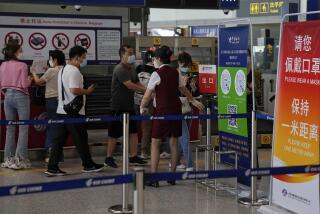Hong Kong Citizens Get Residency Deadline Break
- Share via
HONG KONG — Beijing offered Hong Kong citizens residing overseas a grace period to retain the right to live and work here, easing earlier rules that required them to be present in the territory on the day it reverts to Chinese sovereignty.
China’s State Council said in a communique that Hong Kong Chinese can retain their permanent residency as long as they return within 18 months of the British colony’s July 1 hand-over to China. Once they have returned, they must not stay away for more than a three-year stretch.
People studying abroad or posted overseas are, for residency purposes, not regarded as absent from Hong Kong, the communique added.
Last year, Beijing said all citizens would need to be in Hong Kong at the time of the hand-over in order to retain residency rights.
It was not immediately clear if Monday’s offer was extended to Hong Kong citizens who are not ethnically Chinese.
Uncertainties over residency status had triggered a rush for flights back to the territory by thousands of the nearly 750,000 Hong Kong Chinese who live overseas or hold foreign passports but who want to retain their right to live, work and vote here.
After the 1989 crackdown on demonstrators in Beijing’s Tiananmen Square, hundreds of thousands of Hong Kong citizens scrambled to secure foreign passports to ensure that they could leave the territory if conditions in Hong Kong turned bad under Chinese rule.
An estimated 400,000 Hong Kong residents with foreign passports in this city of 6.4 million also can continue to enjoy the rights of permanent residents without giving up their second passport, China confirmed Monday. Many had worried that Beijing would force them to make a choice come July 1.
China doesn’t recognize dual nationality for its citizens but has agreed to allow Hong Kong residents to keep foreign passports for “convenience” when traveling. Dual nationals will not be eligible for consular protection from their adopted homelands, however, unless they renounce their Chinese citizenship, officials said.
On Monday, Tung Chee-hwa, the Beijing-backed future leader of Hong Kong, welcomed the Beijing communique and said it had “allayed a concern which had for a considerable time preoccupied the Hong Kong community and Hong Kong people living abroad.”
Although the Sino-British committee overseeing transition issues is still haggling over details, one member of the incoming, nonelected Provisional Legislature, Lau Siu-kai, said: “These are already set policies as far as China is concerned. Negotiations have become irrelevant.”
As a formality, the Provisional Legislature is expected to pass the new rules into law July 1.
More to Read
Sign up for Essential California
The most important California stories and recommendations in your inbox every morning.
You may occasionally receive promotional content from the Los Angeles Times.













